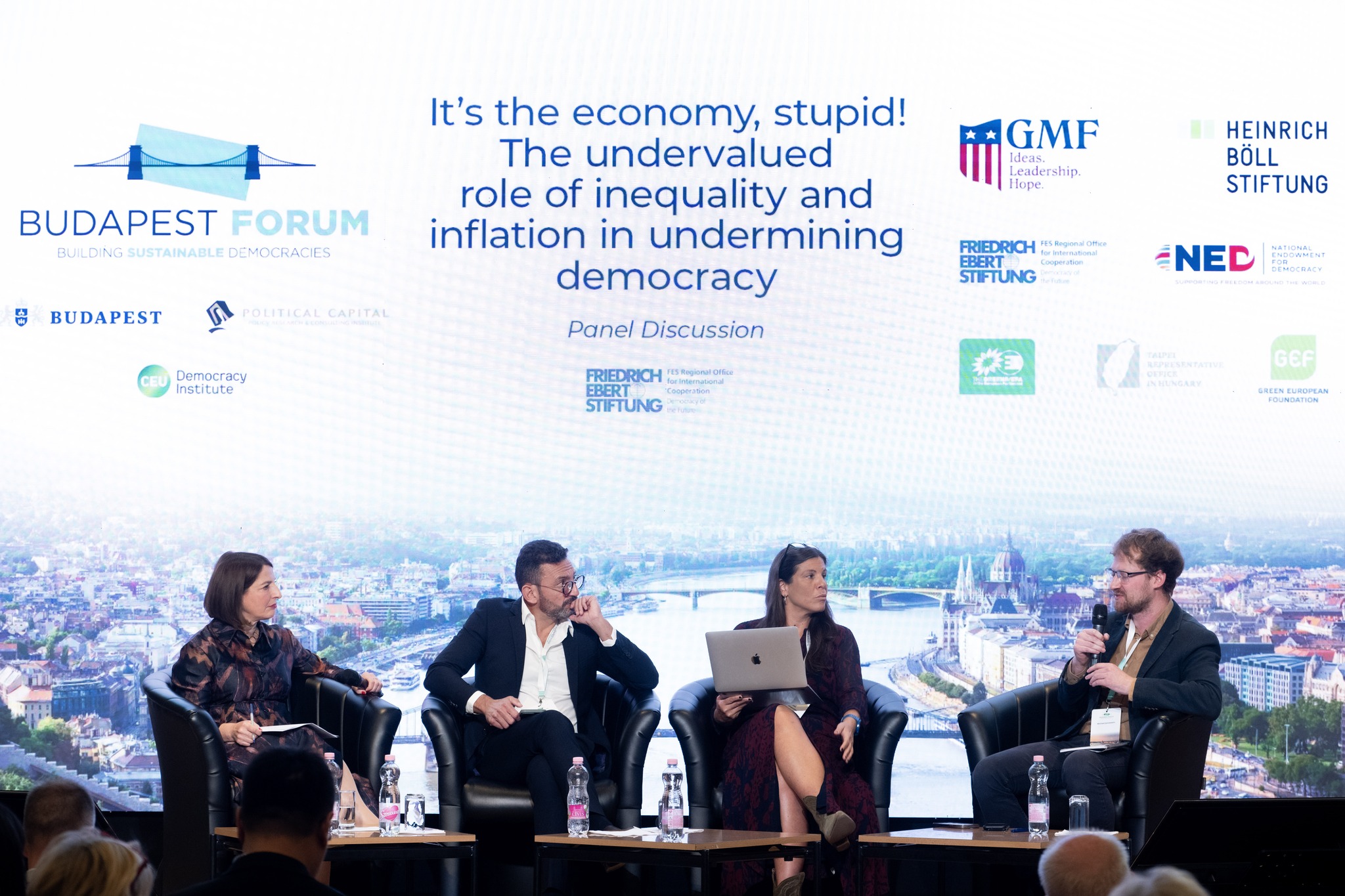Budapest Forum 2023 - It’s the economy, stupid! The undervalued role of inequalities and inflation in undermining democracy
2023-10-19
Speakers
- Daphne Halikiopoulou, Chair of Comparative Politics at the University of York
- Michael Jennewein, Researcher for Democracy and Economics at Friedrich-Ebert Stiftung
- Piergiuseppe Fortunato, Economist at United Nations Conference on Trade and Development
Moderator: Zsuzsanna Szelényi, Program Director, CEU Democracy Institute Leadership Academy; author and former politician

Main takeaways
- When we talk about democracy, we should also speak about inequalities. It is important to understand why certain social groups tend to lose trust in the system, feel left out, and as a consequence start to vote for right-wing and populist parties. It can be explained on more levels. On the one hand, the effects of inflation are socially unequal; it hits back mainly at the lower and middle classes. On the other hand, policies on the legislative level tend to favor the interests of the rich.
- In the national European elections last year, 32% of the voters chose anti-establishment parties, including far-right, far-left, and populist parties. This has significant political implications, as some of these parties erode democratic norms. As the economy is part of the equation, we must examine how specific inequalities and economic policies affect and marginalize certain social groups.
- Voters of the anti-establishment parties consist of different groups and many of them are affected by the economy: 1) ideological voters, who are – in terms of voting – not affected by the economy, 2) materialists – driven by material concerns, e.g. immigration, 3) welfaresists – who are affected by limited welfare provisions and therefore insecure, 4) distrustful voters – they distrust democratic institutions, 5) have problems with access to housing – a large number of the middle class also belongs here.
- The economy is not a set of universal ideas which can be applied in all contexts but rather a set of different models which can be applied in different contexts.
- There is a problem in our system. We aim to have 1) open international markets, 2) national sovereignty, and 3) democracy. It seems that it is impossible to have all of them, we have to give up one – now it is democracy.
- Populism is a threat to democracy. It is essentially an ideology that places the will of the people as the only way to make legitimate and moral decisions in society. Still, it ultimately excludes certain groups as it elevates the will of some people to the will of all the people. The concept of the „people” is misleading – no society has one single will.
- A fundamental problem of our societies is the deeply seeded political polarizations, and the basic democratic norms of consensus building, minorities, and expressing different views are not accepted.
- We should not fight populists by becoming populists. We should try to focus on having a consensus-based understanding of how our democracies need to look like and a positive message about empowering groups that are insecure and affected economically, politically, and socially.
- To fight the far-right's narrative, we must act on two levels: 1) in the discursive sphere – understand their communication strategies and build our narratives, and 2) with structural arguments – which means finding the right policies to solve the problems. There is a need from the other side to put a common narrative forward, which 1) can be concluded in a few sentences and 2) defines the community they are making policy for in a much more inclusive way.
- We need to 1) recover the democratic space, 2) build a story, a new economic narrative about redistribution, and 3) have small stakes.
- From the point of view of the normative theory of liberal democracy, inequality is a failure. Its promise of an equal society that protects everyone and that the fruits of its progress are distributed equally has not materialized. The promise of the EU accession is that joining countries will converge to the level of the EU, which has partly worked so far, but the distribution of the growth within the joining countries was detached, causing many grievances. Next to looking at growth, it is also necessary to look at distribution, welfare and human development.
Policy recommendations
- At all levels, social inequalities must be more in focus, as they have a wide effect on the states of our democracies.
- Fighting against populism by becoming populist is not possible.
- There is a need for a consensus-based understanding of what our democracies need to look like.
- There is a need for a strong narrative, that 1) empowers social groups affected by inequalities, 2) defines community in a much more inclusive way, 3) has structural arguments, and 4) can be concluded in a few sentences.
Copyright 2026. Political Capital Policy Research and Consulting Institute, all rights reserved.

